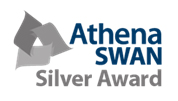School of Chemistry
Athena SWAN
The Athena SWAN Self-Assessment Team includes members from across the School and has representation from all job families and grades. The Team is responsible for implementing existing actions and developing new ones.
What is Athena SWAN?
The Athena SWAN Charter recognises commitment to advancing women's careers in higher education and research in science, technology, engineering, maths and medicine (STEMM). The beliefs underpinning the Charter are:
- The advancement of science, technology, engineering, maths and medicine is fundamental to quality of life across the globe
- It is vitally important that women are adequately represented in what has traditionally been, and is still, a male-dominated area
- Science cannot reach its full potential unless it can benefit from the talents of the whole population, and until women and men can benefit equally from the opportunities it affords
Why is Athena SWAN important?
There is an unequal representation of women in science. In chemistry, this becomes more pronounced the further you travel along the academic career path. The progression from postdoctoral researcher to academic is of particular concern.
Athena SWAN is not about positive discrimination in favour of women, it is about positive action in the form of good practice. The good practice that arises from implementation of the Athena SWAN ethos is of benefit to everyone in higher education.
- Good practice is of benefit to all staff and students; bad practice adversely affects the careers of women more than men
- Good practice does not target initiatives solely at women, processes that are transparent and fair are of benefit to everyone
How are Athena SWAN principles implemented?
The principles are essentially the adoption of good practice in the following areas:
- Personal and professional support and development - covering career development, networks and mentoring
- Appointment and promotion processes – the identification and support of candidates
- Departmental arrangements, structures and culture - including workload, roles and responsibilities and departmental organisation and style
